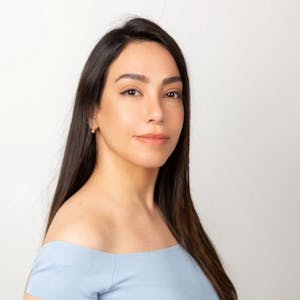Eso te hace sentir como si estuvieras solo. Quieres hablar con otros colegas. Y sí, puedes hacerlo. Julia pregunta si es admitir que no estás calificado. No, quiero decir, ¿sientes eso, Alex o Rodrigo, si necesitaras pedir ayuda? Especialmente de, ya sabes, con uno de los desarrolladores del cliente, ¿te sentirías como, oh Dios mío, no parezco tan experimentado? Puedo ir primero. No siento eso, principalmente porque, por ejemplo, como mencionó Shane. Puedo hablar desde mi experiencia personal con TopDown, que es lo que soy. Entonces, cuando eliges ir y trabajar con TopDown, tienes que pasar por un cierto proceso de selección, ¿verdad? Y este proceso de selección no es el más fácil. No es el más difícil, pero no es el más fácil. Y con ese proceso de selección, podemos entender qué tan experimentado eres en algo. Entonces, diría que si ya estás dentro de una plataforma, probablemente tendrás las habilidades necesarias y no te sentirás no calificado para trabajar en algo. Y otra cosa importante, nuestros colegas internos, nuestro equipo interno pueden entender según tu perfil si eres capaz o no de comenzar a trabajar en algo. Entonces, probablemente no te enviarán a trabajar en algo en lo que no tengas experiencia. Claro. Esa es otra perspectiva. Sí, supongo que desde mi perspectiva, como gerente de proyectos, supongo que es más... Muchas cosas en las que nos quedamos atascados serían más basadas en opiniones. Entonces, tener esas... tener la... poder tener estas conversaciones con otros gerentes de proyectos... Así que, en realidad, antes de que sucediera Covid, en realidad organicé eventos de community en el área en la que trabajo. Es bueno desde el lado técnico. Sé que TopTowel, nuevamente, estoy pensando en la perspectiva de TopTowel, pero sé que TopTowel tiene asociaciones con empresas como Amazon, por ejemplo, AWS. Entonces, si nos quedamos atascados en la documentation o cualquier cosa requerida en ese aspecto, podemos tener un contacto directo dentro de esas organizaciones que pueda ayudar también, lo cual es un beneficio de ser parte de la red. De acuerdo, creo que tenemos una pregunta más de Jon. Vamos a responder esa pregunta y luego, creo que lo que queremos hacer es tomar un descanso y comenzar nuestro desafío. Creo que todos se van a divertir mucho con esto, así que estoy emocionado de ver cómo les va a la gente, y todos ustedes se divertirán mucho con esto. A las personas que lo han hecho realmente les gusta. Así que vamos a seguir adelante. Si no les importa, Alex, Rodrigo, ¿podemos responder la pregunta de John, para que no se quede esperando, él dice, ¿aún tienes que pasar por entrevistas para formar parte del equipo de un cliente y en qué consiste esa entrevista? Entonces, si no les importa, vamos primero, Rodrigo, a veces, sí, a veces. Hay diferentes, supongo que equipos dentro de la red de Tocktail, a veces solo trabajarás con talento de Tocktail, por ejemplo, si es un compromiso de proyectos de Tocktail, solo trabajarás con otras personas dentro de la red y a veces en esos proyectos, al menos en mi experiencia, alguien te presentará al cliente, así que el gerente de entrega te presentará al cliente como parte de ese equipo y el cliente puede aprobar el equipo de inmediato y puedes comenzar a trabajar sin tener que hacer una entrevista adicional con el cliente. A veces, el cliente puede sentir que quiere tener una conversación contigo primero y puede ser que estés trabajando con parte de su equipo y quieran ver cómo te integras con su equipo en el lugar o incluso si es a través de un compromiso donde solo estás trabajando con talento de Tocktail, pueden querer tener una conversación contigo así que a veces tendrás una entrevista y eso puede variar. Quiero decir, generalmente es más para discutir tu enfoque o al menos desde la perspectiva de un gerente de proyectos para discutir el enfoque. Sé que he sido parte de entrevistas con clientes para entrevistar a desarrolladores también y quieren asegurarse de que tengan la experiencia necesaria y un conjunto de habilidades para poder resolver cualquier problema específico que estén tratando de resolver. Así que a veces esas entrevistas pueden involucrar a talento de Tocktail como parte de ella, como un gerente de proyectos o un gerente de productos también. Gracias Alex. ¿Hay algo que quisieras agregar a eso Rodrigo o? Sí, creo que por ejemplo, además del rol de ingeniería dentro de Tocktail, también soy un evaluador, así que puedo hablar sobre una cosa importante, que es básica. Cuando solicitas trabajar en un trabajo, tienes que tener este tipo de entrevista con el cliente para comprender y entenderse mutuamente. Por ejemplo, debes entender cuáles son los requisitos del proyecto y cuáles son los entregables esperados, ¿verdad? Entonces, este tipo de entrevistas son algo bueno para ambas partes, para el cliente y para el profesional que está comenzando a trabajar en algo porque puedes resolver dudas, ¿verdad? Y esto es algo bueno que puedes obtener de esa entrevista. Y desde mi perspectiva, realmente me gusta eso. Creo que es muy beneficioso. De acuerdo, voy a pasarle esto a Rodrigo y vamos a cubrir cómo comenzar. Estas serán algunas cosas básicas desde su perspectiva también, sobre cómo empezar a hacer esto. Entonces, Rodrigo, continúa desde ahí. De acuerdo, perfecto. Así que pasando a esta próxima parte de la masterclass. Voy a tratar de explicarte brevemente cuál es mi perspectiva, mi experiencia y el camino que he tomado para comenzar a trabajar como freelancer. En algún momento de mi career, me quedé atascado en un punto en el que no podía trabajar en las cosas en las que me encantaría trabajar. Y no es solo eso. Sentía que no estaba obteniendo el reconocimiento necesario, como se esperaba. Ese punto crea un punto de estrés en mi vida y siento que me quedé atascado en algún punto. Entonces, en ese punto, nació mi hijo y tengo muchas cosas que hacer, ¿verdad? No solo para mi hijo y ayudar a mi esposa con esa situación, sino también con mi career, que no era buena o no estaba de la manera que esperaba. Así que puse todo en la balanza y elegí entender cuáles son mis habilidades principales, las cosas en las que tengo conocimiento, y las cosas que puedo usar en mi propio beneficio para avanzar y pensar en una career diferente o un pequeño cambio en mi career. Y, por supuesto, puse las cosas malas en el otro lado de la balanza. Entonces, para mí, estaba buscando ser reconocido por mi trabajo, por las cosas que hago, y por las cosas que realmente me encanta hacer, que es programar, ¿verdad? Soy un desarrollador, soy un ingeniero y normalmente a este tipo de profesionales les encanta lo que hacen. Así que estaba buscando eso. Y otra cosa importante, estaba buscando de una manera en la que pueda mejorar mis habilidades. Y lo que quiero decir con eso no son solo habilidades técnicas, sino, por ejemplo, habilidades de idioma, porque, nuevamente, no soy un hablante nativo, no soy un hablante nativo de inglés. Entonces, mi idioma nativo es el portugués, que es completamente diferente a otros idiomas. No se parece ni siquiera al inglés o al español u otros. Así que estaba buscando eso, y estaba buscando de una manera en la que pueda viajar, conocer nuevos lugares, y difundir mis ideas. Así que puse todo esto en la balanza y en el equilibrio, y estaba tratando de entender cómo puedo lograr ese objetivo. En ese punto, elegí ir a la web e investigar para entender si otras empresas de todo el mundo estarían interesadas en alguien que tenga mis habilidades. Encontré algunas opciones. Me postulé. Y lo triste es que fallé en la mayoría de las empresas a las que me postulé. Puedes creer eso. Y en algún punto, me di cuenta de que no son mis habilidades las que son débiles o que tengo alguna falta de experiencia. No es eso. En realidad, no estaba al tanto de cómo funciona el proceso de selección de forma remota. Y cuando me di cuenta de eso pude intentarlo de nuevo, para ser honesto, me invitaron a unirme a la red de Top Times en algún momento. Creo que alguien me envió un enlace en mi LinkedIn. Y cuando, por ejemplo, vi eso y conociendo el trasfondo de Top Times, pensé, oh, okay, si fallé en los otros, probablemente fallaré en este. Y cuando me detuve y pensé en mi career, mi proceso, puse en la balanza una cosa, ¿por qué no intentarlo, verdad? ¿Qué puedo perder si lo intento? Y la respuesta fue muy simple. No tengo nada que perder. Lo intentaré y entenderé si soy adecuado o no.
















Comments